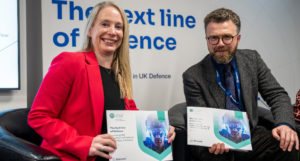Exeter–Queensland partnership striving to improve the security of global communication

Fibre optic cables - photo by Denny Muller on Unsplash
A new international research collaboration has been launched focusing on one of the biggest challenges in contemporary communications.
Experts at the University of Exeter and the University of Queensland will work together on a breakthrough technology called Quantum Link Verification, which promises to improve security in an increasingly connected, data-driven world.
Developed by Exeter’s Quantum Non-Equilibrium Group (QNEG) and Queensland’s Quantum Technology Laboratory (QTLab), QLV uses the rules of quantum physics to detect if anyone is trying to intercept information travelling through fibre-optic cables.
Modern communication systems depend heavily on these cables, but even with encryption, the cables themselves remain vulnerable to eavesdropping, especially as quantum computing becomes more powerful. Current methods of protecting infrastructure, like armoured cabling or post-quantum cryptography, can be expensive, slow, or uncertain in their long-term effectiveness.
QLV offers a radical new approach. Instead of trying to prevent tampering physically or digitally, it makes eavesdropping impossible to hide. The system sends individual particles of light (photons) alongside normal data traffic. Any attempt to intercept them causes a change in their state, instantly revealing the intrusion.
Led by Professor Andrew White at Queensland, and Professor Janet Anders in Exeter’s Department of Physics and Astronomy, both internationally recognised experts in quantum science, the project will also help train a new generation of quantum researchers and strengthen industry collaboration with VeriQuantix.
“The beauty of QLV is that it doesn’t require building entirely new infrastructure,” says Professor Anders. “It can be layered on top of existing systems, making it a fast and cost-effective way to vastly improve communication security.”
The project has been awarded £150,000 in funding through the UQ Exeter Institute’s Strategic Grant Scheme, which supports high-impact, strategically aligned research between the two universities. The work will begin in 2025 and is scheduled to run until 2027, including a funded postdoctoral position to support academic training and development.
It will work towards building a working QLV prototype using commercially available telecom components; establish proof that it can reliably detect attempts to tap into the system by simulating a range of intrusion methods; and test its effectiveness in real-world settings, such as noisy networks.
If successful, QLV could mark a major milestone in the future of cybersecurity, delivering real-world benefits for individuals, businesses, and governments alike.



